It’s not uncommon for women to wonder what to eat during a pregnancy.
The answer is rather uncomplicated, if not a bit extensive. The best diet in pregnancy contains healthy fats, protein, omega-3s, fiber, folate, and a wide array of vitamins.
I’m Pregnant, Now What?

Many women dream of the day when they’ll look down at a little white stick and see the double line. I know I did. Since I was about twelve.
Okay, well I didn’t dream of the pee stick way back then. I didn’t know all the ins and outs of the process. But I did adore babies and their squishy faces.
When we do see that second red slash, excitement tightens the chest.
Some have even been known to jump up and down with ear piercing shrieks. I’m a little more subdued and did an internal happy dance.
Then comes a sinking feeling. We dreamed and planned for this moment.
The announcements and the baby shower. The joy of watching our bodies grow and feeling the movement of tiny kicks. The moment of holding that screaming bundle in our arms.
Yet, we didn’t think of the finer details. There’s a tiny, frail human inside of us now.
What are we supposed to eat? What should be avoided? Can I still work out? Should I start working out? Questions sprint circles in our heads.
The most important matter to focus on is diet.
What to Eat During in the First Trimester of Pregnancy
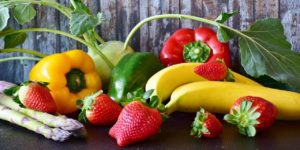
The key to a healthy pregnancy is to eat a well-balanced diet. While it’s ideal to eat healthy before you’re pregnant, it’s definitely not too late to start now.
Beans/Lentils
Chickpeas in particular are an amazing legume, packed with nutrients. They are high in B-6, which makes them the best food for pregnancy nausea. They also contain protein, calcium, folate, fiber, iron, and zinc.
As an added benefit, chickpeas create butyrate, which has been shown to get rid of sick and dying cells. They also contain eight of the nine essential amino acids our body needs.
Bananas
Bananas are another nutrient rich food that helps fight nausea. They are a great way to get potassium into your diet. Not only that, but they give women more energy. Just what we need when experiencing pregnancy fatigue.
Eating bananas aids in the baby’s neurological development.
Oats
Oatmeal is one of the best ways to satisfy hunger. However, it’s a complex carbohydrate and shouldn’t be eaten in excess.
Oats contains folate and iron. Folate is essential in preventing neural defects in the baby.
Due to its high fiber content, it’s beneficial for regular bowel movement.
Avocado
Avocado makes an excellent addition to a healthy diet. It’s considered a superfood by many.
That’s because it contains healthy fat, Vitamin A, B, C, K, and E, iron, folate, potassium, and Omega 3s. It’s everything in a small green package.
However, be careful not to eat too much of this fruit. Too much fat, even a healthy fat, can harm the liver.
Yogurt
Yogurt is full of probiotics. These are necessary to promote a healthy gut. If the mom’s gut isn’t healthy, the baby’s won’t be either.
It also contains calcium, which is important for supporting mom and baby’s bones.
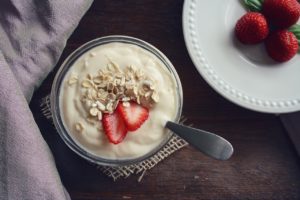
Berries
Berries are a quick and easy way to snack. They are a good source of vitamin C and help keep you hydrated.
All berries, especially cranberries, promote urinary tract health.
Frozen mixed berries are actually how I kicked my sugar habit. Pour yogurt over them and you have an incredibly delicious treat.
Dried Apricots
Dried Apricots are a delicious snack that comes with the added benefit of being great for the immune system.
There should be no need for arm twisting with this one. This dried fruit is also high in fiber, and gives a good dose of potassium and vitamin A.
Carrot Juice
Carrots provide high amounts of Beta Carotene (Vitamin A). An important vitamin for the health of you and baby’s eyes.
Drinking this juice is considered one of the best ways to fight fatigue and minimize the risk of gestational diabetes.
This miracle vegetable also provides healthy skin and muscles for the developing baby.
Eggs
Free range eggs are another superfood. They are filled with amino acids, protein, and iron. Omega 3 and choline encourages baby’s brain development. Choline is also needed for the metabolism to run properly.
What to Eat During the Second Trimester
It’s important to continue to eat the foods listed above throughout the entire pregnancy. But there are some foods that are most beneficial during the second trimester.
Nuts/ Seeds
Nuts and seeds are a fantastic way to get healthy fats into your diet. They are also high in fiber and amino acids.
Sesame seeds in particular are a nutrient powerhouse. They contain iron which supplies oxygen to the baby growing in the womb. This is especially important during the second trimester.
Dark Leafy Greens
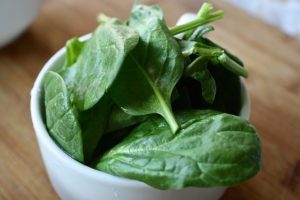
All dark leafy greens are a must during pregnancy. Kale and spinach being at the top of the list.
They are high in antioxidants, and one of the only foods to have naturally occurring Vitamin K. Eating these promote eye, bone, skin, and cell growth.
Fish
Wild caught salmon is one of the best fish to add into your diet. Not only do they provide Omega 3 fatty acids, but they are full of DHA and EPA.
Fish in general is good for brain and nervous system development.
What to Eat During the Third Trimester
It’s funny how we can stumble across answers we never would have even thought of.
I discovered that Chickpeas were good for nausea from watching Bones. And while looking for what to eat during the third trimester, I happened upon dates.
Dates
I love to eat dates. They are quick and easy snacks. Rather tasty too. But I wouldn’t have guessed they were actually beneficial for preparing for birth.
When 6 dates are consumed daily, starting at 36 weeks:
- Women have higher rates of spontaneous labor. And the use of induction medication is much lower.
- They have a considerably higher average cervical dilation upon admission. This usually means a shorter labor if progressing normally.
- A much higher rate of women have intact membranes upon admission.
Foods to Avoid During Pregnancy
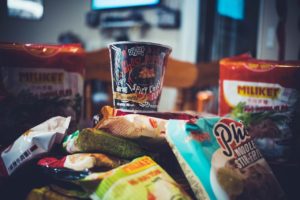
There are a few reasons that a pregnancy can become high risk. Eating unhealthy foods is right at the top.
There are many items on the list of foods to be avoided. Far more than I was ever told about.
Alcohol
There’s no safe amount of alcohol to consume while pregnant.
Even small amounts of alcohol can cause miscarriage, stillbirth, preterm labor, and low birth weight.
Processed Junk Food
American junk food is filled with all kinds of ingredients that are banned in the UK.
They also contain high levels of sodium, Trans fats, and processed sugar.
Eating junk food increases your likelihood of developing gestational diabetes and increases the chance of genetic abnormalities in your baby. Among other things.
I highly recommend reading Feeding You Lies. It breaks down what the ingredients in your food really mean, and how they may be harming your health.
Trans Fats
With the Standard American Diet (SAD- fitting right?) it’s extremely difficult to avoid Trans fats. Especially if you eat out at restaurants.
However, there are studies showing there is a link between them and heart diseases. They even affect brain function.
What’s even worse, is that Trans fats can transfer into the baby’s brain cells. This harmful fat can cause emotional issues, hyperactivity, and memory problems.
High Mercury Fish
It should come as no surprise, but avoiding high mercury fish is a must while pregnant. Consuming high levels of mercury is toxic to the nervous system.
Fish with the most mercury are shark, King Mackerel, swordfish, and tilefish.
Undercooked Fish, Meat, and Eggs
Not cooking your food to an adequate temperature allows bacteria and parasites to stay in the meat. This may subject you to toxoplasmosis, listeria, E. Coli, or Salmonella.
Excessive Amounts of Caffeine
As much as we wish it weren’t true, coffee crosses the placenta.
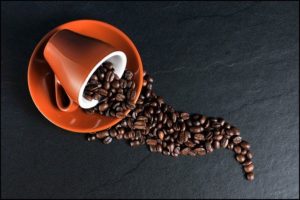
Studies show that any more than 200mgs of caffeine per day increases risks of miscarriage, low birth weight, or stillbirth.
Even with limited evidence, the American Association of Obstetricians and Gynecologists recommend that pregnant women avoid drinking more than this amount a day.(1)
This may be due to the fact that many women have congested livers and kidneys.
Coffee and other caffeinated beverages, puts extra stress on these organs, and they are vital to maintaining a healthy pregnancy.
Think About It
I really wish I had thought more about what to eat during a pregnancy.
Unfortunately, people mention a few of the healthy food items, but neglect the ones to be avoided. Besides the top obvious ones of course.
The best diet in pregnancy should highlight the negative effects of junk food and coffee as well. We need to stop skirting topics that we think may not go over well with others.
I probably would’ve been incredibly grumpy to hear that I should throw out all my candy. But if I knew why, I would have burned the toxic treats.
It may be hard to eat different than we are used to, but the benefits are worth the sacrifice.